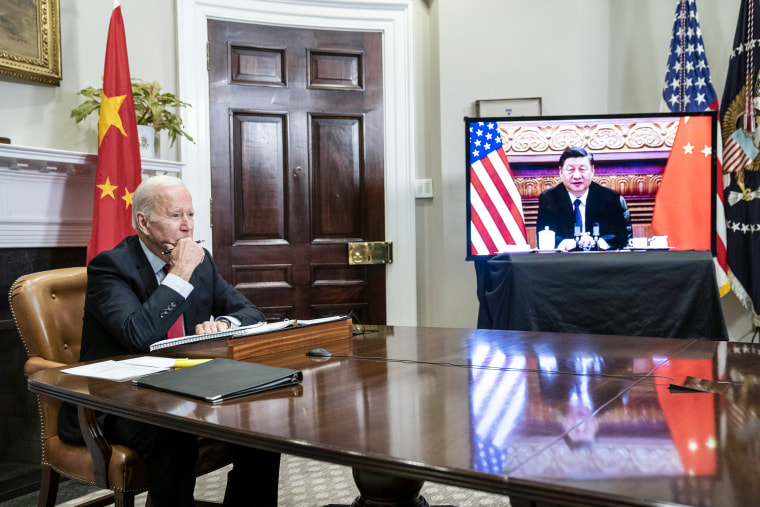WASHINGTON — President Joe Biden and Chinese leader Xi Jinping spoke Thursday amid growing tensions between the two countries around Taiwan, the economy and Russia’s invasion of Ukraine.
The call, Biden's fifth with Xi, lasted over two hours, though past calls have lasted around as long because the conversations need to be translated. The two leaders discussed a number of issues hanging over both Biden and Xi at home and abroad, including the economic slowdowns facing both countries, the effects of Russia's invasion and the continuing Covid pandemic.
The two leaders also discussed Taiwan, an issue that has added pressure on their relationship in recent months. During the call, Biden told Xi "the United States strongly opposes unilateral efforts to change the status quo or undermine peace and stability across the Taiwan Strait," the White House said in a statement following the call.
"The two discussed that the United States and China have differences when it comes to Taiwan, but that they have managed those for over 40 years and that keeping an open line of communication on this issue is essential to doing so," said a senior administration official.
China had stronger language in their summary of the call when it comes to the issue of Taiwan.
"Those who play with fire will perish by it," Chinese officials said in a statement regarding the call. "It is hoped that the U.S. will be clear-eyed about this."

U.S. officials have raised alarm over the fate of the self-ruling democracy that Beijing claims as its territory as China has been increasing its military activity around Taiwan. According to a readout of the call provided by China, Xi reiterated China's opposition to Taiwanese independence.
Biden said in May during a trip to Japan that the U.S. would be willing to intervene militarily if China were to invade Taiwan, drawing a strong rebuke from Chinese officials. He later clarified that U.S. policy had not changed.
China has also issued a series of threats in recent days around House Speaker Nancy Pelosi’s possible trip to Taiwan.
Biden has said that U.S. military officials believe it is “not a good idea right now” for Pelosi to travel to Taiwan, though both Democrats and Republicans in Congress have urged her to go. Pelosi’s office hasn’t confirmed whether she will stop in Taiwan during a trip to Asia next month, citing security protocols.
Ahead of the call, John Kirby, a spokesperson for the National Security Council, said Biden was seeking to keep the lines of communication open with China and to cooperate on issues where there is common ground, while trying to improve areas where there is tension.
“The president wants to make sure the lines of communication with President Xi remain open, because they need to,” he said.
Kirby downplayed the threats China has made around a possible visit by Pelosi.
“Frankly, that kind of rhetoric is unnecessary and uncalled for,” he said in a call with reporters Wednesday. He said China’s rhetoric only “escalates tensions and is completely unnecessary. So we find that unhelpful and certainly not in the least bit necessary, given the situation.”
Biden also raised the issue of the need to resolve the cases of American citizens who are wrongfully detained in the country and “longstanding concerns about human rights,” the official said.
The two leaders talked about ways to cooperate on climate change and health security. They also discussed a potential face-to-face meeting, the official said.
Biden has also been seeking to blunt China's support for Russia following its invasion of Ukraine.
Beijing hasn’t publicly condemned the invasion and has increased its purchasing of discounted Russian oil. During a call with Xi in March, Biden warned him that there would be consequences for Beijing if it provided “material support” for Russia.
"The two leaders really exchanged a sense of both where things stand at the moment with respect to the conflict as well as their concerns about where things might develop," the official said regarding the war in Ukraine. "I would not characterize any particular breakthroughs."
Biden did not raise the issue of whether the U.S. would lift some of the $350 billion in tariffs placed on China under the Trump administration, a move Biden has said he has been considering since May as a way to ease prices for American consumers. Treasury Secretary Janet Yellen, who spoke with China’s top trade negotiator earlier this month, has said eliminating some of those tariffs could help ease inflation, though the effects would be limited.
"He did not discuss any potential steps he might take with President Xi, and it would be wrong to believe that somehow a decision on any next steps were somehow waiting for this conversation," the official said.
China's Covid lockdowns have had a ripple effect on the U.S. economy by contributing to disruptions in the global supply chain.
China faces its own economic struggles. Its "zero-Covid" policies have led to rolling lockdowns across the country that have drastically slowed the country's economic growth.
